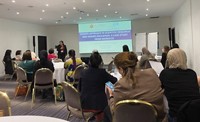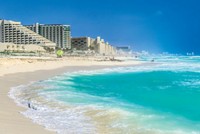Advertisement
Grab your lab coat. Let's get started
Welcome!
Welcome!
Create an account below to get 6 C&EN articles per month, receive newsletters and more - all free.
It seems this is your first time logging in online. Please enter the following information to continue.
As an ACS member you automatically get access to this site. All we need is few more details to create your reading experience.
Not you? Sign in with a different account.
Not you? Sign in with a different account.
ERROR 1
ERROR 1
ERROR 2
ERROR 2
ERROR 2
ERROR 2
ERROR 2
Password and Confirm password must match.
If you have an ACS member number, please enter it here so we can link this account to your membership. (optional)
ERROR 2
ACS values your privacy. By submitting your information, you are gaining access to C&EN and subscribing to our weekly newsletter. We use the information you provide to make your reading experience better, and we will never sell your data to third party members.
Environment
Chemists Gather In Prague
International Chemistry: European Association for Chemical & Molecular Sciences holds fourth biennial conference
by Sarah Everts
August 28, 2012

Nearly 1,800 chemists are in Prague this week to attend the European Association for Chemical & Molecular Sciences (EuCheMS) conference, Europe’s largest chemistry meeting.
“The idea is to provide a showcase of European chemistry”—the same as at the American Chemical Society or Chemical Society of Japan meetings, says Pavel Drašar, vice-president of the Czech Chemical Society and chair of this year’s EuCheMS organizing committee.
With 12 concurrent sessions over five days and nine plenary lectures—five of which are given by Nobel Laureates—participants at this year’s conference have a wide diversity of talks to choose from, including the latest ice-core radiocarbon-dating techniques, new green chemistry catalysts, the latest strategies for imaging diseased cells, or new charge-storage memory devices.
“I’m just finishing my Ph.D. in carbohydrate chemistry, and now I’d like to do something a little different,” says Ralph Hollaus of the University of Natural Resources & Life Sciences, in Vienna. “I’m here to get new ideas and to think about what to do next.”
EuCheMS is the umbrella organization for 44 chemical societies across 32 European countries. With some 160,000 members, the organization aims to be “the voice of chemistry in Europe,” says Jay S. Siegel, a synthetic organic chemist at the University of Zurich.
The chemical societies combined forces in 2004 to increase visibility of the chemical enterprise to European lawmakers. “Our statements are increasingly appreciated by the European authorities and have more impact than national opinions,” notes EuCheMS president Ulrich Schubert.
With a membership roughly the same as that of ACS, EuCheMS could become equally important among chemists in 20 years, Siegel says.
This year, participants travelled to Prague from across the European region but also from as far afield as the U.S., Japan, Egypt, Kazakhstan, and Iran. ACS, which publishes C&EN, sponsored nine U.S.-based students to travel to EuCheMS and was represented at the meeting by Madeleine Jacobs, ACS’s executive director and chief executive officer, as well as Peter J. Stang, editor-in-chief of the Journal of the American Chemical Society.
The next EuCheMS meeting will take place in 2014 on Aug. 31 to Sept. 4 in Istanbul, Turkey.




Join the conversation
Contact the reporter
Submit a Letter to the Editor for publication
Engage with us on Twitter